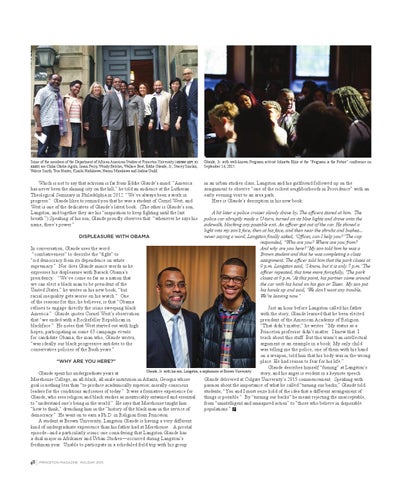Some of the members of the Department of African American Studies at Princeton University (shown left to right) are Chika Okeke-Agulu, Imani Perry, Wendy Belcher, Wallace Best, Eddie Glaude, Jr., Stacey Sinclair, Valerie Smith, Tera Hunter, Kinohi Nishikawa, Naomi Murakawa and Joshua Guild.
Glaude, Jr. with well-known Ferguson activist Johnetta Elzie at the “Ferguson is the Future” conference on September 14, 2015.
Which is not to say that activism is far from Eddie Glaude’s mind. “America has never been the shining city on the hill,” he told an audience at the Lutheran Theological Seminary in Philadelphia in 2012. “We’ve always been a work in progress.” Glaude likes to remind you that he was a student of Cornel West, and West is one of the dedicatees of Glaude’s latest book. (The other is Glaude’s son, Langston, and together they are his “inspiration to keep fighting until the last breath.”) Speaking of his son, Glaude proudly observes that “whenever he says his name, there’s power.”
in an urban studies class, Langston and his girlfriend followed up on the assignment to observe “one of the richest neighborhoods in Providence” with an early evening visit to an area park. Here is Glaude’s description in his new book:
displeasure with Obama
In conversation, Glaude uses the word “combativeness” to describe the “fight” to “rid democracy from its dependence on white supremacy.” Nor does Glaude mince words as he expresses his displeasure with Barack Obama’s presidency. “We’ve come so far as a nation that we can elect a black man to be president of the United States,” he writes in his new book, “but racial inequality gets worse on his watch.” One of the reasons for this, he believes, is that “Obama refuses to engage directly the crisis sweeping black America.” Glaude quotes Cornel West’s observation that “we ended with a Rockefeller Republican in blackface.” He notes that West started out with high hopes, participating in some 65 campaign events for candidate Obama, the man who, Glaude writes, “was ideally our black progressive antidote to the conservative policies of the Bush years.”
A bit later a police cruiser slowly drove by. The officers stared at him. The police car abruptly made a U-turn, turned on its blue lights and drove onto the sidewalk, blocking any possible exit. An officer got out of the car. He shined a light into my son’s face, then at his face, and then near the shrubs and bushes... never saying a word. Langston finally asked, ‘Officer, can I help you?’ The cop responded, “Who are you? Where are you from? And why are you here?’ My son told him he was a Brown student and that he was completing a class assignment. The officer told him that the park closes at 9 p.m. Langston said, ‘I know, but it is only 7 p.m.’ The officer repeated, this time more forcefully, ‘The park closes at 9 p.m.’ At this point, his partner came around the car with his hand on his gun or Taser. My son put his hands up and said, ‘We don’t want any trouble. We’re leaving now.’
Just an hour before Langston called his father with the story, Glaude learned that he been elected president of the American Academy of Religion. “That didn’t matter,” he writes. “My status as a Princeton professor didn’t matter. I knew that. I teach about this stuff. But this wasn’t an intellectual argument or an example in a book. My only child was telling me the police, one of them with his hand on a weapon, told him that his body was in the wrong “Why Are You Here?” place. He had reason to fear for his life.” Glaude describes himself “fuming” at Langston’s Glaude, Jr. with his son, Langston, a sophomore at Brown University. Glaude spent his undergraduate years at story, and his anger is evident in a keynote speech Morehouse College, an all-black, all-male institution in Atlanta, Georgia whose Glaude delivered at Colgate University’s 2015 commencement. Speaking with goal is nothing less than “to produce academically superior, morally conscious passion about the importance of what he called “turning our backs,” Glaude told leaders for the conditions and issues of today.” It was a formative experience for students, “You and I must seize hold of the idea that a different arrangement of Glaude, who sees religion and black studies as inextricably entwined and essential things is possible.” By “turning our backs” he meant rejecting the unacceptable, to “understand one’s being in the world.” He says that Morehouse taught him from “unintelligent and uninspired action” to “those who believe in disposable “how to think,” drenching him in the “history of the black man in the service of populations.” democracy.” He went on to earn a Ph.D. in Religion from Princeton.  A student at Brown University, Langston Glaude is having a very different kind of undergraduate experience than his father had at Morehouse. A pivotal episode--and a particularly ironic one considering that Langston Glaude has a dual major in Afrikaner and Urban Studies—occurred during Langston’s freshman year. Unable to participate in a scheduled field trip with his group
48 |
PRINCETON MAGAZINE holiday 2015
PM_EddieGlaudeHoliday2015.indd 6
11/11/15 1:46:32 PM
